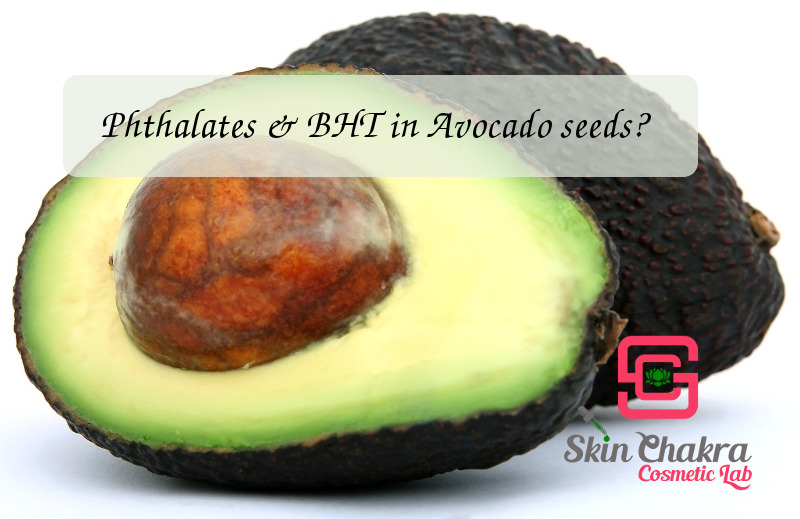
Donnerstag, 31. August 2017
Phthalates and BHT in avocado seed?!!!

As a chemist, I do not approve chemophobia and I'm not afraid of chemicals. I don't believe that everything coming from nature is automatically safe and could be used without any precautions or everything made in the lab is dangerous and toxic. The term "nasties" or "nasty chemicals" drives me nuts (although I often use the term "disgusting ingredients").
I have prepared hundreds of "synthetic" formulations with acrylate, PEG-s and even (don't faint) parabens and I still have a few totally unacceptable ingredients in my lab. I turned my back to "synthetic" and "mainstream" industry years ago (read this blog post to know more about my reasons) and never looked back again.
However, there have been two topics during the last week that even frightened me and it seems to me that nobody else is concerned abou these news. As I searched the internet for more information or at least any comments, thoughts, explanations, all I could see/read was the babbling of the media, reporting the same thing one after one (copying from each other) and ignoring the most important part of the story.
One of these frightening news was:
Women with Flame Retardant Chemicals in Urine Have Reduced Birth Successes
and I find it quite frightening. Not that I'm really concerned about the low fertility rates (call me whatever you like) but about the fact that flame retardants are swallowing us from inside and outside and it seems that nobody is really concerned abou this. Environmental activists and NGOs make such a fuss about 1 ppt of lead in lipsticks (lead is a natural contaminant of "natural" minerals) but they completely ignore the presence of flame retardants in our blood and urine (at least I didn't observe any media coverage about this).
The second issue which is even more frightening was here:
Avocado seed husks could be a gold mine of medicinal and industrial compounds
The news was about finding medicinal compounds in avocado seeds (which is excellent) and the greed of the industry to turn trash into treasure. We already have other seeds which are usually considered as trash, turned into treasure and being sold for different applications. Apricot seed, almond seed, brazil nut seed, plum seed and co are widely used as natural (and much more expensive) alternatives to PE beads in scrubs for example.
At the end of this exciting report they mention:
In the wax, the researchers detected benzyl butyl phthalate, a plasticizer used to promote flexibility in numerous synthetic products from shower curtains to medical devices; bis(2-butoxyethyl) phthalate, which is used in cosmetics; and butylated hydroxytoluene (BHT), which is a food additive.
I found at least 20 sites that repeated this report blabbering about the uniqueness of avocados and the next super-fruit-food that we have been discarding for centuries without raising the question about phthalates and BHT (although they mention that phthalates are plasticizers).
Perhaps you already know that phthalates belong to the most disgusting and unwanted ingredients in cosmetics and perfumery. They are completely synthetic with no similar counterpart in nature (even parabens have similar counterparts in food). In the EU, most phthalates, including the benzyl buty phthalate found in avocado seeds are banned in cosmetics because of their reprotoxicity. Some phthalates are still being used in perfumery because it seems that they are the only way to manage high viscosity and sticky resinoids.
I couldn't even find the other phthalate (bis 2-butoxyethyl phthalate) in the CosIng directory, it is not even a cosmetic ingredient (not even listed as a banned ingredient). It is applied in: indirect food additives, adhesives and components of coatings.
Congratulations
BHT or butylated hydroxytoluene, is a synthetic antioxidant which is (unfortunately) not banned and is still widely used in conventional cosmetics (finished products as well as raw material) and in food.
My serious concern and the question that everybody failed to ask while they were repeatedly reposting this report is:
What on earth these synthetic ingredients are doing in avocado seeds?
These are lipophilic ingredients. If they are in the seeds, could they be found in the pulp and in the oil as well? Where else can we find these unwanted (and partially banned) ingredients?
I'm just going having my late lunch which is a green salad without any avocado. I have lost my apetite for avocado.
BeHappy and have fun

